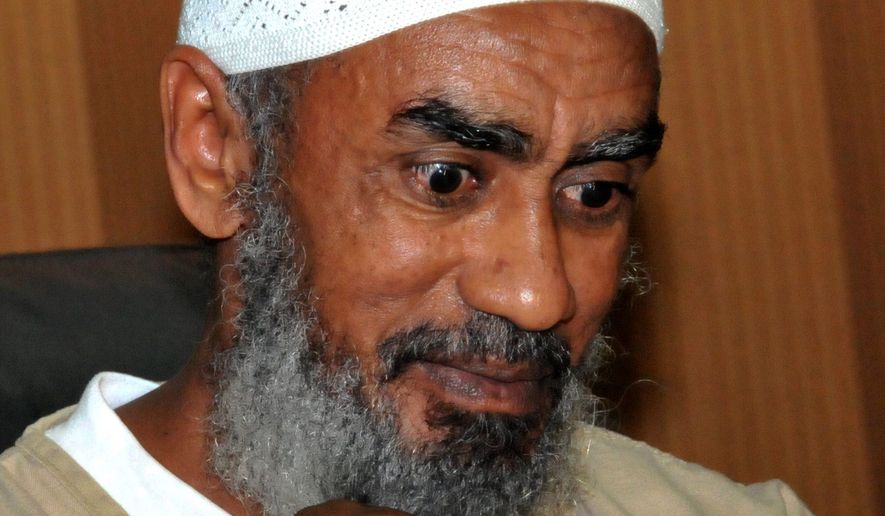A former Guantanamo inmate whom the Obama administration released on assurances that he would not go back to terrorism has emerged as a top al Qaeda leader in a video urging Muslims to kill Americans.
Ibrahim al-Qosi has resurfaced as a committed terrorist while President Obama and congressional Republicans engage in a battle over the fate of the U.S. military prison in Cuba and its 107 remaining inmates. Mr. Obama has vowed to close the facility and may transfer to the U.S. the remaining prisoners, including Khalid Sheikh Mohammed, mastermind of the Sept. 11, 2001, terrorist attacks.
For nearly seven years, he has met stiff opposition from Republicans, either on grounds that the inmates are too dangerous to be moved or that the White House has failed to submit a plan on how the closing and transfers would be accomplished.
Al-Qosi, whom the Defense Department released in 2012 into the custody of his native Sudan, has become chief spokesman for al Qaeda in the Arabian Peninsula and one of its scholars who justify violence in the name of the Koran.
Based in Yemen, AQAP has a dedicated mission to attack the U.S. homeland. It nearly succeeded in bringing down an airliner over Michigan in 2009 using a bomb hidden in its operative’s underwear.
The Middle East Media Research Institute captured, translated and released a new AQAP video that features al-Qosi for the first time.
The institute quoted al-Qosi as justifying “individual jihad” — meaning lone wolves willing to kill Americans.
“As [the mujahedeen] have placed the U.S. at the top of their list, the U.S. has placed them at the top of its list,” the terrorist said. “And as the U.S. has waged war on us remotely as a solution to minimize its casualties, we have fought it remotely, as well by individual jihad. And as the U.S. has killed our men, we have killed its people — but it is not the same. Our dead are in heaven and theirs are in the hellfire.”
According to the research institute and other sources, al-Qosi was a close associate of Osama bin Laden. He was bin Laden’s accountant when the al Qaeda leader lived in Sudan and fought alongside him when bin Laden made his escape from Tora Bora, Afghanistan.
The Defense Department released al-Qosi, one of the first al Qaeda operatives captured in Afghanistan, after he pleaded guilty to a minor terrorism charge.
Sudan was supposed to reintegrate him into society as a law-abiding citizen.
At the time of his release, his attorney, Paul Reichler of Washington, said the Defense Department concluded that al-Qosi was a changed man.
“One of the main reasons the United States was willing to return him to Sudan was the U.S. confidence in the government of Sudan’s program and its confidence that Mr. al-Qosi would not represent any kind of threat to the United States. If they had considered him a threat, they would not have released him,” Mr. Reichler said, according to a report by The Washington Post.
Mr. Reichler told The Miami Herald: “He is an intelligent, pious, humble and sincere individual who has endured much hardship the past 10 years. But he returns home without hatred or rancor.”
The Defense Department last month announced the latest releases from Guantanamo Bay, saying five Yemenis had been transferred to the custody of the United Arab Emirates. The department said the former detainees were no longer threats to the U.S.
Of the 653 prisoners released as of last summer, 117 have been confirmed as terrorists and another 79 have been suspected of re-engaging in terrorism, according to a Director of National Intelligence report.
That works out to a recidivism rate of 18 percent and a possible additional rate of recidivism of 12 percent.
The Obama administration touts the fact that the recidivism rate under its review process is much lower than that of President George W. Bush. Conservatives counter that the rate is increasing as more intelligence is gathered on those released in recent years.
On the resurfacing of al-Qosi, Navy Cmdr. Gary Ross, a Pentagon spokesman, said: “We take any incidence of re-engagement very seriously. More than 90 percent of the detainees transferred under this administration are neither confirmed nor suspected by the intelligence community of re-engagement. We work in close coordination through military, intelligence, law enforcement and diplomatic channels to mitigate re-engagement and to take follow-on action when necessary.”
This week, Senate Armed Services Committee Chairman John McCain, Arizona Republican, again chastised the White House for not submitting, as requested, its plan for closing the prison.
Addressing Defense Secretary Ashton Carter at a hearing, Mr. McCain recalled that Mr. Carter and a counterterrorism official met in the senator’s office years ago when the defense chief was a lower-ranking official.
“You were going to send this committee a plan on the closure of Guantanamo,” said Mr. McCain, who favors closing the facility. “We still have not gotten that plan, Mr. Secretary. So if you are a little bit concerned about the lack of movement [of nominees], I have been a little concerned about a lack of movement on Guantanamo for the last seven years.”
The Wall Street Journal reported that the White House has rejected a plan as too expensive to build a $600 million prison in the U.S. for high-risk detainees, some of whom, such as Mohammed, will never be released.
• Rowan Scarborough can be reached at rscarborough@washingtontimes.com.




Please read our comment policy before commenting.